|
|
|
Sort Order |
|
|
|
Items / Page
|
|
|
|
|
|
|
| Srl | Item |
| 1 |
ID:
005027
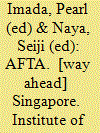

|
|
|
|
|
| Publication |
Singapore, Institute of Southeast Asian Studies, 1992.
|
| Description |
xv,142p.
|
| Standard Number |
9813016515
|
|
|
|
|
|
|
|
|
|
|
|
Copies: C:1/I:0,R:0,Q:0
Circulation
| Accession# | Call# | Current Location | Status | Policy | Location |
| 036138 | 341.2473/IMA 036138 | Main | On Shelf | General | |
|
|
|
|
| 2 |
ID:
099937
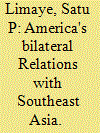

|
|
|
|
|
| Publication |
2010.
|
| Summary/Abstract |
This special issue of Contemporary Southeast Asia examining United States bilateral relations with Myanmar, Cambodia, Indonesia, Laos and Vietnam, and specifically the mutual efforts at "rapprochement", "re-engagement" or "revitalization", is informed by several considerations. First, the Obama administration took office with a declared commitment to improve relations with the Association of Southeast Asian Nations (ASEAN) as an organization and moved with alacrity to implement a number of policy decisions to that end. Second, and in parallel, the administration highlighted opportunities for broader and deeper bilateral relations with specific ASEAN member countries…Together, this focus on Southeast Asia is an important element of the current administration's overall focus on US relations with the Asia Pacific - a focus which represents one of the most significant periods of US regional activism in decades.
|
|
|
|
|
|
|
|
|
|
|
|
|
|
|
|
| 3 |
ID:
167466
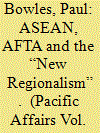

|
|
|
| 4 |
ID:
055613
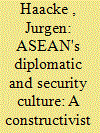

|
|
|
| 5 |
ID:
109810
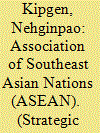

|
|
|
|
|
| Publication |
2012.
|
| Summary/Abstract |
Though the original focus of the Association of Southeast Asian Nations (ASEAN) was primarily economic cooperation, the adoption of the ASEAN charter in November 2007 officially included cooperation on human rights. This article examines three hypotheses to determine the causes of cooperation problems: regime type, non-interference policy, and absence of an enforcement mechanism in the ASEAN charter. The article argues that regime type is important but it is neither a necessary nor a sufficient condition; the non-interference policy is necessary but not sufficient; and it is the absence of an enforcement mechanism in the ASEAN charter that causes cooperation problems on human rights.
|
|
|
|
|
|
|
|
|
|
|
|
|
|
|
|
| 6 |
ID:
021568
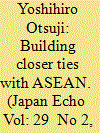

|
|
|
|
|
| Publication |
April 2002.
|
| Description |
8-12
|
|
|
|
|
|
|
|
|
|
|
|
|
|
|
|
| 7 |
ID:
073563
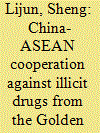

|
|
|
|
|
| Publication |
2006.
|
| Summary/Abstract |
This article studies the cooperation mechanisms between China and ASEAN (the Association of Southeast Asian Nations) to control drug trafficking in the Golden Triangle. Cooperation currently falls into three categories: under the framework of ASEAN+1 (China) and ASEAN+3 (China, Japan, and South Korea); under the framework of Greater Mekong Sub-Region (GMS) cooperation; and between the local governments of China and Myanmar, Laos, and Vietnam. The article explores deficiencies in this cooperation and ways it can be improved.
|
|
|
|
|
|
|
|
|
|
|
|
|
|
|
|
| 8 |
ID:
170974
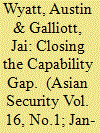

|
|
|
|
|
| Summary/Abstract |
The procurement of autonomous weapon systems is on the rise in Southeast Asia, where, as in other parts of the world, interest in the military applications of unmanned systems is outpacing fractured international regulation efforts. This article analyzes the diffusion of drone technology in Southeast Asia and argues that we are at an inflection point, representing an opportunity for The Association of Southeast Asian Nations (ASEAN) to control the diffusion of unmanned platforms and take a leadership role in developing a regionally appropriate framework for their development. Moreover, it contends that with a regional framework in place to reduce tensions/misadventure, unmanned aerial and maritime vehicles (UAVs & UMVs) could improve ASEAN’s ability to respond to traditional and non-traditional security threats, and thus increase regional security.
|
|
|
|
|
|
|
|
|
|
|
|
|
|
|
|
| 9 |
ID:
140728
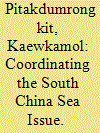

|
|
|
|
|
| Summary/Abstract |
This article studies the roles of Association of Southeast Asian Nations country coordinators in shaping negotiation outcomes, which have been under-examined. A question: ‘What makes an effective coordinator?’ is explored. ‘Effectiveness’ is the ability to shape outcomes in one's direction. This paper argues that a coordinator's effectiveness is rooted in resource management, not resource possession. To be effective, the coordinator must turn the resources at hand into bargaining leverage vis-à-vis the others. To validate the argument, this paper demonstrates how Thailand, taking advantage of its coordinator position, advanced the talks on the Code of Conduct of the South China Sea resulting in the first formal consultation in September 2013.
|
|
|
|
|
|
|
|
|
|
|
|
|
|
|
|
| 10 |
ID:
127694
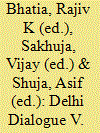

|
|
|
|
|
| Publication |
New Delhi, Shipra Publications, 2014.
|
| Description |
xxix, 249p.Hbk
|
| Standard Number |
9788175417298
|
|
|
|
|
|
|
|
|
|
|
|
Copies: C:2/I:0,R:0,Q:0
Circulation
| Accession# | Call# | Current Location | Status | Policy | Location |
| 057591 | 327.54059/BHA 057591 | Main | On Shelf | General | |
| 057598 | 327.54059/BHA 057598 | Main | On Shelf | General | |
|
|
|
|
| 11 |
ID:
074748
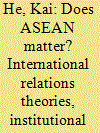

|
|
|
|
|
| Publication |
2006.
|
| Summary/Abstract |
The 1997 economic crisis and the ensuing political and social disorders not only have put regional security at stake, but also have seriously challenged the relevance of the Association of Southeast Asian Nations (ASEAN) in regional affairs. This article introduces a new institutional theory – institutional realism – to address the widely debated questions: Does ASEAN matter? If so, how? It argues that (1) ASEAN still matters in terms of coping with extra-regional threats through an institutional balancing strategy; (2) ASEAN's future depends on its institutional consolidation in dealing with intra-regional security problems.
|
|
|
|
|
|
|
|
|
|
|
|
|
|
|
|
| 12 |
ID:
073997
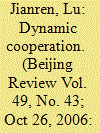

|
|
|
| 13 |
ID:
019825
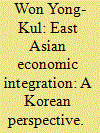

|
|
|
|
|
| Publication |
Spring/Summer 2001.
|
| Description |
72-96
|
|
|
|
|
|
|
|
|
|
|
|
|
|
|
|
| 14 |
ID:
021465
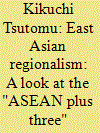

|
|
|
|
|
| Publication |
Spring 2002.
|
| Description |
23-45
|
|
|
|
|
|
|
|
|
|
|
|
|
|
|
|
| 15 |
ID:
171022
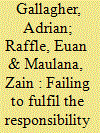

|
|
|
|
|
| Summary/Abstract |
The article provides the first substantive analysis of the war on drugs in the Philippines under the Responsibility to Protect. It develops in two stages. First, it argues that the war on drugs constitutes crimes against humanity through an analysis of, (i) extrajudicial killings and vigilante justice, (ii), dehumanisation, and, (iii) the exaggeration of threat. Second, it examines the response of the permanent five members of the UN Security Council (p5) and the Association of Southeast Asian Nations (ASEAN). Despite that the US, the UK, and France have expressed public concerns, we show that they prioritise counter-terrorism and trade over the Responsibility to Protect. Meanwhile, China and Russia uphold the view that the war on drugs is a matter of domestic jurisdiction. Regarding ASEAN, we draw on 26 semi-structured elite interviews conducted in South East Asia (2016-2018) to evidence that the elites prioritise state sovereignty and non-interference. The outcome is that there is a significant protection deficit as the government of the Philippines, the p5, and ASEAN are failing to protect those targeted in the war on drugs. We hope that the article will act as a catalyst for a much needed conversation on the international community’s political, legal, and moral responsibilities regarding mass violence against drug users in international relations.
|
|
|
|
|
|
|
|
|
|
|
|
|
|
|
|
| 16 |
ID:
116805
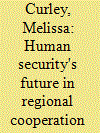

|
|
|
|
|
| Publication |
2012.
|
| Summary/Abstract |
Political elites in East Asia tend to view the concept of human security with scepticism. On the one hand, broader notions of security are acknowledged. However, traditional views on sovereignty and deeply embedded norms relating to non-intervention and consensus politics have fostered conservative views towards parts of the human security agenda that challenge state/elite perspectives. This article identifies and explores this tension, and comments on the potential for different 'strands' of human security to inform future regional cooperation and dialogue, and concludes that human security's breadth continues to fuel an endless debate about its clarity and utility in East Asia. Such confusion is a challenge for its future relevance in the region, both as a conceptual tool and as a policy agenda.
|
|
|
|
|
|
|
|
|
|
|
|
|
|
|
|
| 17 |
ID:
048551
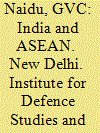

|
|
|
|
|
| Publication |
New Delhi, Institute for Defence Studies and Analyses, 1998.
|
| Description |
78p.
|
| Series |
Delhi Papers; no.8
|
| Standard Number |
8186019146
|
|
|
|
|
|
|
|
|
|
|
|
Copies: C:1/I:0,R:0,Q:0
Circulation
| Accession# | Call# | Current Location | Status | Policy | Location |
| 040359 | 327.54059/NAI 040359 | Main | On Shelf | General | |
|
|
|
|
| 18 |
ID:
074987
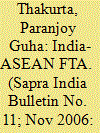

|
|
|
| 19 |
ID:
129903
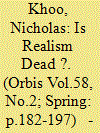

|
|
|
|
|
| Publication |
2014.
|
| Summary/Abstract |
The author contends that prominent strands in the recent literature on Asia's international relations reflect a lack of appreciation for the actual policy of regional states, which is deeply realist in orientation.
|
|
|
|
|
|
|
|
|
|
|
|
|
|
|
|
| 20 |
ID:
074735
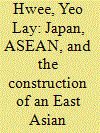

|
|
|
|
|
| Publication |
2006.
|
| Summary/Abstract |
In his 2006 New Year message, Japanese Prime Minister Junichiro Koizumi pledged to improve relations with neighbouring countries. Underlying this message is perhaps the understanding that its relations with its neighbours, particularly its near neighbours China and Korea have been less than ideal.
However, Prime Minister Koizumi also made it clear that Japan s foreign relations would remain based on the Japan-US alliance. This perhaps reiterated what his Foreign Minister Mr Taro Azo said not long after he was appointed foreign minister that in Japan s foreign relations, it is US first, Asia second . No one doubts the importance of the Japan-US relationship, just as no one would underestimate the importance of getting Sino-US relations right if the stability of the region is to be assured. However, while China has been working hard to maintain a proactive and responsible regional policy in Asia, Japanese policy towards Asia has at best been unclear and uncertain, and at worst raised serious questions about Japan s perception of itself and its relations with the rest of Asia. One wonders if Japan, though geographically located in East Asia, considers itself politically and psychologically East Asian.
This article focuses on Japan s relations with Southeast Asia and ASEAN, and examines how Japan s ambivalent attitude towards the East Asian region may impact the construction of an East Asian Community which ASEAN purports to be in the driving seat.
|
|
|
|
|
|
|
|
|
|
|
|
|
|
|
|
|
|
|
|
|